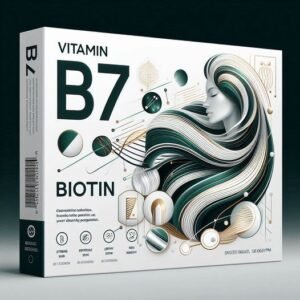Vitamin B Complex Series: (Episode Six) Vitamin B7 Biotin (Biotin)
- What is Vitamin B7?
Vitamin B7, also known as biotin, is a water-soluble vitamin that belongs to the B complex group. It plays an important role in supporting the health of skin, hair, nails, and metabolic processes in the body. It also contributes to converting nutrients into energy. - The active form of biotin is “D-Biotin,” which the body uses efficiently to support various vital processes.
- Benefits of Biotin (Vitamin B7) Based on Reliable Scientific Sources:
- Enhancing Hair and Nail Health:
Biotin improves hair growth and reduces hair loss. It also strengthens nails and prevents brittleness and breaking. - Improving Skin Health:
Biotin helps maintain skin moisture and elasticity and reduces skin inflammation and allergies, such as rashes. - Supporting Metabolism:
Biotin contributes to the conversion of carbohydrates, fats, and proteins into energy, supporting vital body functions. - Improving Nervous System Health:
It plays a role in supporting nerve cells and improving memory and concentration, helping to reduce stress and mental fatigue. - Supporting Heart Health:
It helps improve levels of good cholesterol (HDL) and reduces the risk of heart disease by supporting vascular health. - Regulating Blood Sugar Levels:
It helps improve the body’s response to insulin, assisting in the regulation of blood glucose levels. - Enhancing Thyroid Health:
It supports the production of hormones necessary for regulating metabolism and maintains thyroid activity. - Supporting Pregnancy Health:
Biotin is essential for proper fetal development and reduces the risks of birth defects. - Improving Nutrient Absorption:
Biotin helps enhance the body’s absorption of other nutrients, such as zinc, promoting overall health. - Reducing Inflammation:
Biotin plays a role in alleviating chronic inflammation, helping to prevent some inflammation-related diseases.
- Enhancing Hair and Nail Health:
- Symptoms of Vitamin B7 Deficiency:
- Hair loss.
- Dry skin and rashes.
- Weak and brittle nails.
- Muscle weakness.
- Feelings of fatigue and exhaustion.
- Mood changes and anxiety.
- Digestive and metabolic problems.
- Causes of Biotin Deficiency:
Biotin deficiency can result from several causes, such as:- Intestinal diseases and kidney diseases.
- Certain antibiotics.
- Nicotine.
- Strict dietary regimens.
- Severe psychological stress.
- Excessive exercise.
- Pregnancy.
- Aging.
- Sources of Vitamin B7:
- Eggs (especially egg yolks).
- Meat and liver.
- Nuts (almonds, walnuts).
- Legumes and whole grains.
- Avocado.
- Salmon.
- Sweet potatoes.
- Nutritional yeast or brewer’s yeast.
- Cauliflower.
- Recommended Daily Intake for the Average Person:
- Adults: 30 micrograms per day.
- Pregnant women: 30-35 micrograms per day.
- Children: Dosage ranges from 5 to 25 micrograms depending on age.
- Excessive Intake of Vitamin B7:
There are usually no reports of negative effects from excessive biotin intake, but it’s best to stick to recommended doses to avoid any rare complications.
Anas’ Advice:
To maintain the health of your hair, skin, and nails, make sure to get biotin from its natural sources. If you need to take it as a dietary supplement, ensure it is in its active form, D-Biotin, for the best results.



